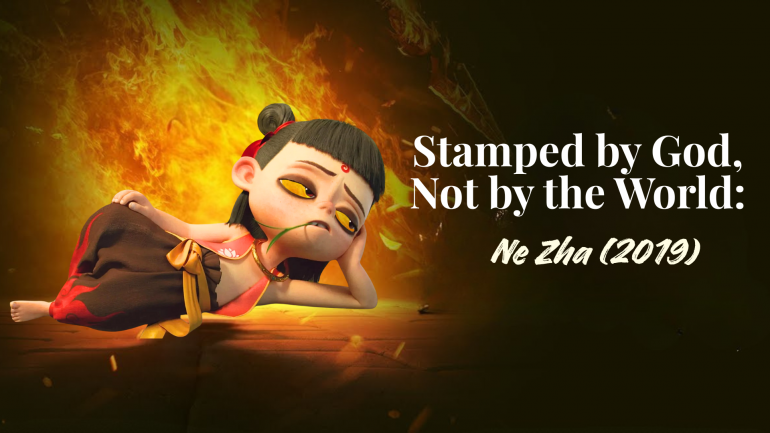Stamped by God, Not by the World: Ne Zha (2019)

“Ne Zha” (2019) is a Chinese animated film that takes viewers on a visually stunning and emotionally charged journey. Directed by Yu Yang, it became a landmark in Chinese cinema, grossing over $700 million worldwide and earning the title of the highest-grossing animated film in China’s history.
The plot follows a young boy, Ne Zha, who is born as the reincarnation of a demon orb, destined to bring destruction. As he struggles against his demonic nature and the fear of the townsfolk, he must choose between good and evil to change his fate and become a hero. He has immense power, but is burdened by society’s prejudice and fear. To many, he is a curse, a danger, a problem to be contained. Yet beneath his fiery temper and rebellious nature lies a heart longing to be understood, accepted, and loved.
The movie builds itself on the tension between destiny and freedom, good and evil, rejection and belonging.
At its heart, the movie Ne Zha is not merely about magic, gods, or fate; it is about identity. Who am I really? Am I the label others put on me, or am I the person God created me to be? These questions echo far beyond Chinese mythology; they resonate deeply with our biblical story. Drawing from Chinese philosophy, especially Yin and Yang and the Five Elements, the film shows how opposing forces shape destiny. Ne Zha embodies fire: intense, uncontrollable, destructive at times, yet also filled with passion and resilience. Ao Bing, his counterpart, embodies water: calm, composed, yet subdued by expectations. Their friendship and eventual conflict reveal how we wrestle both with inner forces and with the judgments placed upon us.
What appealed to me most in the movie is not their fight against destiny, but against prejudice. The world stamps Ne Zha with an identity: demon, troublemaker, disaster waiting to happen. People see only danger and refuse to look deeper. Isn’t this true of our world today? Think of the labels: poor, refugee, orphan, addict, criminal, failure. Once they stick, they blind us to the person and wound the one who bears them. Ne Zha shows what happens when someone is caged inside a false identity: he lashes out, hurts others, and begins to believe the lie himself. Yet when love, trust, and friendship enter, his truest self emerges.
In one of the film’s most powerful scenes, Ne Zha declares, “I am the master of my fate, not some prophecy!”, a line that resonates universally with anyone who has felt trapped by labels. But perhaps the most defining line of the movie comes when Ne Zha insists, “They call me demon. They think I’m a curse. But that’s not who I am.” It captures the heart of his journey, a refusal to be defined by fear or prejudice, and a bold step toward his truest identity.
That shift in perspective is the heart of the Christian story. Our dignity is not rooted in how others perceive us or in our worst actions, but in the unshakable truth that we are made in the image and likeness of God. The Book of Genesis proclaims: “God created humankind in his image… and indeed, it was very good” (Gen 1:27, 31). Not half good, not partly flawed, very good. This is our real identity. No prejudice, mistake, or label can erase it. Yet, like Ne Zha, many of us struggle to live this truth, carrying wounds, rejection, or guilt, until we confuse our experiences with who we are. But Christian faith reminds us: God defines us not by our past, but by His image within us and His Son who redeems us.
Ne Zha’s journey is not about escaping destiny but rewriting it. It mirrors the Gospel where grace gives us freedom to rise above the fate the world writes for us.
The world may say: You are condemned. God says: You are forgiven.
The world may say: You are useless. God says: You are chosen.
The world may say: You are broken beyond repair. God says: You are loved into wholeness.
Watching Ne Zha, I asked myself: How often do I let others’ opinions shape my worth? How often has prejudice blinded me to the image of God in another? The film reminds us that no one is simply “a demon child.” Beneath every hardened heart is a child longing for love. Beneath every rough edge is God’s “very good” creation waiting to shine. In the end, Ne Zha becomes a mirror. His fiery rebellion is our cry against the boxes the world puts us in. His struggle for acceptance is our thirst for belonging. His courage to choose who he really is and not what the world says becomes an invitation for us to do the same.
So perhaps the question the movie leaves us with is not about destiny or fate, but something much more personal:
Do I live by the false labels the world stamps on me, or do I dare to live out the “very good” image God placed within me?
(Joshua D’Souza, SJ, is a Jesuit scholastic belonging to the Bombay Province, India. He is currently a third-year theology student at Vidyajyoti, Delhi)








